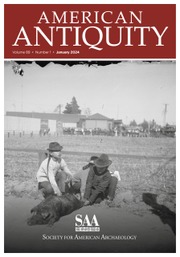Article contents
Dialectics, Heterarchy, and Western Pueblo Social Organization
Published online by Cambridge University Press: 20 January 2017
Abstract
Rautman's critique of our article “Although They Have Petty Captains They Obey Them Badly: The Dialectics of Prehispanic Western Pueblo Social Organization” (McGuire and Saitta 1996) provides us with an opportunity to clarify some points about our theoretical perspective. Rautman shares our dissatisfaction with attempts to characterize Prehispanic western pueblo social organization as either egalitarian or hierarchical. She, however, questions our dismissal of processual theory and our advocacy of a dialectical approach to the problem. She proposes instead an alternative approach that relies on the concept of heterarchy. We have little problem with the use of heterarchy as a descriptive label for late Prehispanic pueblo social organization, but we desire a more dynamic understanding of that organization than the concept of heterarchy allows. We find that understanding in a dialectical approach.
Résumé
La crítica de Rautman de nuestro artículo “Although They Have Petty Captains They Obey Them Badly: The Dialectics of Prehispanic Western Pueblo Social Organization” (McGuire and Saitta 1996) nos ofrece una oportunidad de clarificar nuestra perspectiva teórica. Rautman está de acuerdo con nuestra crítica de los intentos de calificar la organización social de los Indios prehispánicos de los Pueblos Occidentales como una sociedad igualitaria o como sociedad jerárquica. Sin embargo, ella desconfía de nuestro rechazo de teoria procesual y nuestro apoyo del uso de una teoria dialectíca para explicar la organización social de estos Indios prehispánicos. Alternativamente, ella propone el concepto de heterarquía. Nos gusta el concepto de heterarquía para describir la organización social de los Indios Pueblo en el época prehispdnica tardia, pero deseamos un conocimiento de esa organización más dinámica de lo ofrecido por el concepto de heterarquía. Encontramos este conocimiento en una teoria dialéctica.
- Type
- Comments
- Information
- Copyright
- Copyright © The Society for American Archaeology 1998
References
Notes
1. The cultural area that archaeologists have traditionally called the Southwest includes the Mexican states of Sonora and Chihuahua. From the perspective of Mexico this is the Northwest. The label Southwest/Northwest preserves the traditional term but also breaks down the chauvinism of only viewing the area from a North American perspective.
- 11
- Cited by


